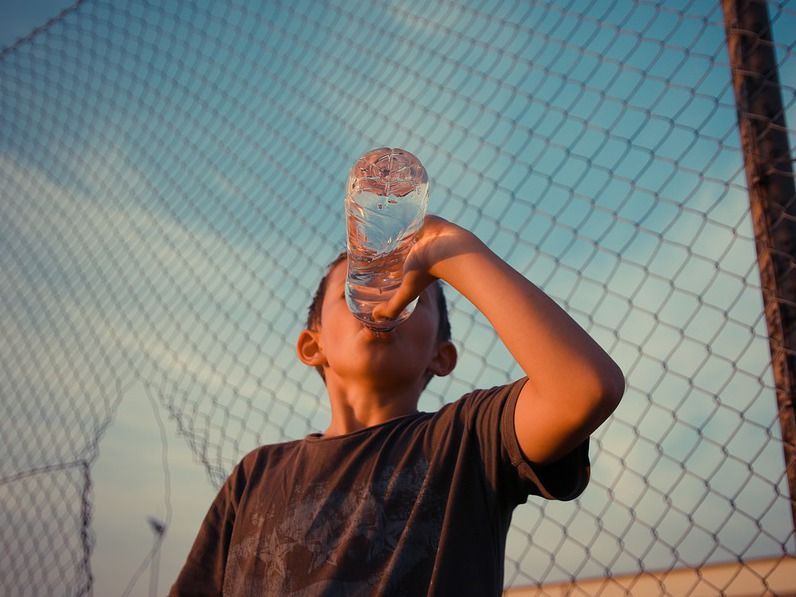Children should drink water
Children's Health Foundation strongly advises restricting consumption of sugary lemons, colas and energy drinks to stop the wave of obesity
Marco is an average German teenager. He drinks an average of just under half a litre of cola a day. His friends between the ages of 11 and 13 also drink an average of 0.45 litres of cola, soda or another sugary drink every day. That means an average of 1,260 calories per week. It doesn't sound like much, but it is: If Marco simply drank water instead of cola, he would be a whole pound slimmer after just 2.8 weeks. With this fictitious example the donation makes child health attentive to the fattening effect of sugar-containing beverages.
"A recently published analysis of eleven international studies comes to the conclusion that a regular consumption of beverages containing sugar is responsible for about one fifth of the risk of obesity in children and adolescents," says pediatrician and adolescent physician Prof. Dr. Berthold Koletzko, nutrition expert at the University Children's Hospital in Munich and chairman of the Children's Health Foundation. "Studies from the USA also conclude that about 20 percent of the weight gain of the population there is due to sugary beverages alone".
The frequency of overweight and pathological obesity (obesity) has increased alarmingly in the last four decades worldwide and also in Germany. The current figures of the nationwide health study KiGGS do not show any breakthrough: At present, almost every sixth child in Germany between three and 17 years of age (15.3 percent of girls and 15.6 percent of boys) suffers from overweight. 5.9 percent (5.5 percent of girls and 6.3 percent of boys) are already pathologically obese. "The hope of many parents that the problem with baby fat will grow out in the course of puberty and that even a chubby teenage fish will later turn into a slender young woman with a slim gene, is unfortunately deceptive," emphasises Professor Koletzko. "Fat children usually become fat adults.
Less income, more overweight
Professor Koletzko emphasises that the risk of overweight is particularly high for children and adolescents from educationally disadvantaged families. According to current figures from the KiGGS study, girls from socioeconomically disadvantaged families are 4.05 times more likely to be obese than girls with a high socioeconomic status. For boys from disadvantaged families, the risk is even 4.4 times higher (11.4 versus 2.6 percent) than in families with a high level of education and income.
The Children's Health Foundation has already repeatedly pointed out the fattening effect of sugared drinks. She recommends: Children should learn to drink water from an early age. Lemonade, cola drinks, sweetened teas or iced teas, sugar-containing fruit juices, fruit nectars or fruit juice spritzers should remain the exception and not the rule. Day-care centres and schools should not offer beverages containing sugar.
What is the case for a sugar levy?

jarmoluk/Pixabay
- The Foundation is also in favour of introducing a levy on sugared drinks. Their justification:
- The higher price would reduce consumption and thus the risk of obesity, fatty liver and tooth decay in the population.
- The state could invest the additional tax revenues in the promotion of public health.
- The population would be made aware that sweetened drinks are not part of a healthy diet.
- Manufacturers would have a strong incentive to offer their products with less sugar, sweetening and healthier alternatives.
A good example is Mexico, where a tax of one peso per litre of sugared drinks was introduced four years ago. Professor Koletzko: "In this country with a particularly high incidence of obesity in children and adults, the tax led to a 6.3 percent decrease in the sale of sugared beverages, while sales of packaged water increased by 16.2 percent. The strongest effects were achieved in low and middle-income households, which also have the highest incidence of obesity.
Many other countries have already followed Mexico's example. Sugar drinks are already taxed in Brunei, Catalonia, Portugal, Saudi Arabia, Thailand, the United Arab Emirates and five cities in the USA. This year the tax will also be introduced in Estonia, Great Britain, Ireland, South Africa and the city of Seattle (USA).
The fact that the taxation of sweet drinks can indeed have positive effects on the health of children and adolescents is demonstrated by the example of Great Britain, reports the Children's Health Foundation. Since April 2018, manufacturers and importers have had to pay levies on sugar-sweetened beverages. For drinks with more than five to a maximum of eight percent sugar, 18 British pence per litre is estimated and for drinks with more than eight percent sugar, 24 pence. Scientists have calculated that these measures and the reduced consumption of sugar with drinks in the UK can result in 144,000 fewer obese children and adults, 19,000 fewer cases of type 2 diabetes and 270,000 fewer caries-damaged dentures per year, with correspondingly high immediate cost savings in healthcare.
Less sugar? It's all right!
The sugar consumption of the British, however, decreased significantly shortly after the announcement of taxation. How so? In order to benefit from the more favourable tax bracket, many manufacturers have reduced the sugar content of their products to such an extent that they are subject to lower taxation or no taxation at all. For example, Coca-Cola in Great Britain has reduced the sugar content of Fanta from 6.9 to 4.6 grams per 100 ml and of Sprite from 6.6 grams to 3.3 grams. Supermarket chains have also lowered the sugar content of many private labels below the five-gram limit.
In Germany, on the other hand, the average sugar content of sugar-sweetened beverages is 7.3 percent according to current Foodwatch surveys. That is still about six sugar cubes per 250 ml glass.
"Overweight is influenced both by eating and drinking and by physical activity. In practice however the relative portion of the movement is clearly smaller thereby than the meaning of the nutrition , explains professor Berthold Koletzko. The resident of Munich nourishing expert clarifies that at the fictitious example of Carlo, which takes on the average daily 450 ml sugar-containing beverages to itself. "If he would replace this quantity of sugared beverages by of water, Carlo could save a kilogram weight in five and a half weeks. On the other hand, he would have to play one extra hour of football every week for 19 weeks to reduce his weight by one kilogram. For the same change in weight, he would have to swim an extra hour for 33 weeks or ride a bicycle for almost 40 weeks.
Water marches - even at school!
The Trinkfit study proved that the promotion of water drinking also works in Germany with more than 3,000 primary school children in North Rhine-Westphalia. The children taking part in the study were given their own drinking bottles and were able to obtain sparkling or still drinking water from a drinking water dispenser at any time, while the supply of beverages containing sugar was stopped at school. Bottle, water dispenser and teaching materials were not made available to the children of the control schools until the end of the school year. The study showed that if children drink water regularly and sufficiently at school, their risk of becoming overweight is reduced. Overall, the risk of overweight was 31 percent lower among the children who participated in the action than among those who did not.
A special levy on beverages containing sugar, as it already exists in Great Britain, Mexico and many other countries, could also make it easier to choose healthier beverages in Germany, emphasizes the Children's Health Foundation. Professor Dr. Berthold Koletzko: "We hope very much for the readiness of the politicians to take consistent measures, because the burdens of the child obesity existing today for disease consequences and limited life chances are enormously high. The health costs alone for children and adolescents who are overweight in Germany today amount to 1.8 billion euros. So it is high time to act".




























































